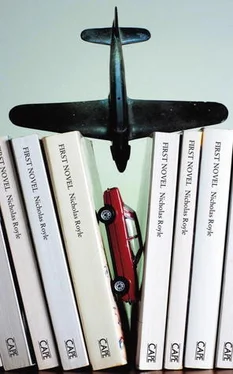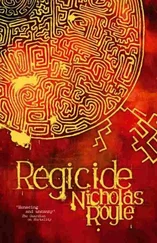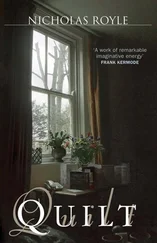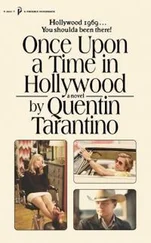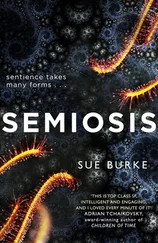I apologise and hang up. I run downstairs and open the door.
There’s a man on the doorstep wearing a blue driver’s uniform jacket over a Manchester United shirt. He has dark hair going grey cropped to the length of his stubble. A gap between his two front teeth and a bigger gap in the bottom set where he’s lost a tooth and not replaced it. A tattooed spider’s web crawls up the side of his neck from under the United shirt. He’s holding a bulky electronic device with a keypad, a little screen and a stylus attached by a curly plastic flex.
‘Sorry about that,’ I say.
‘No worries, mate. Expecting a chair?’
‘Er, yeah.’
‘Sign here.’
I sign and he steps aside to reveal the chair standing on the path behind him.
‘All yours, mate,’ he says.
‘Thanks.’
I carry the chair into the house and stand it in the hall for a moment. I get a knife from the kitchen and cut through the strong plastic wrapping. It is a black office chair with a wide curved back and sturdy armrests. Connected to the shaft under the seat are a number of controlling levers. It’s quite heavy and an awkward shape, but I manage to carry it upstairs without crashing into the wall or having to take a break. I wheel it into my study. I pull my old chair away from my desk and slide the new one into place. Finally, slowly and with a certain amount of ceremony, I lower myself on to the chair and feel it gently sigh at it takes my weight.
It offers my back lots of support and is extremely comfortable. As it should be, given how much I’ve paid for it.
It is a Herman Miller Aeron chair.
It is the chair that Geoff Dyer, Alain de Botton, Francesca Simon and Siri Hustvedt all use.

Since coming back from Zanzibar and then shortly afterwards visiting Russell Flynn’s family in Whitley Bay, Ray had spent most of his time living in a small flat in Whalley Range, Manchester, trying to decide what to do with his life. He visited his parents in Hyde. With Ray’s blessing they adopted Nicholas. The boy called them his Nana and Grandad; Ray was Daddy, and Mummy, if Nicholas ever asked, was in heaven. Ray felt a little uneasy about this, but he accepted that it had to be his parents’ choice what they told the boy since they were giving his son a home and an upbringing, and in any case, Ray couldn’t think of a better alternative.
Ray read a lot — poetry, mainly — and applied to university with a view to perhaps taking teacher-training qualifications in due course. He was aware of England winning the World Cup at Wembley — it was hard not to be — but football had never been among his interests and the way the RAF had handled the death of Flynn had dealt a blow to his sense of national pride.
William Dunstan’s trial was set for September at the Old Bailey. It meant missing the start of university, but Ray had no choice. He would be called as a witness. Even if he hadn’t been required to attend, he would have done so. He owed it to Flynn and he was curious about Dunstan.
Over the summer he listened to a lot of jazz at home and went to concerts in Southport, Stockport and Manchester. He was living on a small pension from the RAF, which he thought of as blood money; he supplemented it with a few shillings earned collecting glasses at pubs around Ardwick.
The RAF offered to find him accommodation in London, but he preferred not to have to rely on their help and sorted himself out with a bedsit in Earls Court. He visited some of the local pubs, which appeared to be favoured by either Australians or homosexuals. Either way, the company was overwhelmingly male.
On the opening day of the trial, having been told that he might be called on the first day but equally might not be, Ray was led to the witnesses’ room. There were two other people present. One, a stocky man wearing a blue suit with his red hair shaved up the back of the neck, was sitting with his back to the door. Ray had only ever seen Henshaw in his engineer’s overalls, but he was easily recognisable from behind. The other man, a court usher, exchanged a few quiet remarks with the woman who had escorted Ray, before she left again.
Ray found his thoughts escaping from the room like smoke and drifting into another part of the building. He pictured Billy Dunstan, sat in profile in the dock. Composed, erect and alert, impeccably turned out in his squadron leader’s uniform, he would cut quite a different figure from the dashing individual in his leather flying jacket and white silk scarf. His dark reddish-brown hair, glistening with Brylcreem, would be combed straight back from his forehead, with a severe side parting. Ray tried to imagine Dunstan’s barrister, and his opposite number, but found that he couldn’t.
Which of them, Ray wondered, would he end up doing battle with? It depended which version of the truth he told. How important was it to mention, for example, the sexual attraction between Dunstan and the nurses he was trying to impress? It only had to be mentioned and it would stick. It would help to convict. All Ray had to do was stay away from that angle. The nurses were on the plane because they had been invited by Flight Lieutenant Campbell. With Campbell having been drawn away to Pemba Island, Dunstan had merely sought to avoid the nurses’ disappointment by still allowing them on board. He was a kind man, a gentleman. What happened to Flynn was a terrible accident, a tragedy.
It would depend on what Frankie and Joan, the nurses, said on oath.
And on what Ray said, too.
Ray had never seen justice operate at first hand, and while he understood it and knew how it was meant to work, he felt anxious. What if the defence barrister wasn’t as persuasive as the prosecutor? Supposing the defence had the balance of evidence slightly in their favour, but the prosecuting barrister was the more accomplished orator and cross-examiner? An innocent man might easily go down. Or a guilty man get off. It all rested on the intelligence of the jury, on their ability to see through all the arguments, specious and otherwise. They had to be able to see through, say, the prosecutor’s efforts to establish a defendant’s guilt even when it was clear to everyone in the room that the man was not guilty.
In the case of Dunstan, Ray was still undecided.
Ray’s reverie was interrupted by the sound of the door opening. He looked up and saw the two nurses, Joan and Frankie, entering the room. He caught Frankie’s eye, but she immediately looked away, first at Joan and then down at the ground. Joan didn’t look in his direction. Together the two women sat in a similar position relative to Ray as Henshaw, although several seats away from the engineer, and Ray was left to contemplate the backs of their heads as they leaned close and whispered to one another.
The first day was adjourned and Ray was yet to be called. He decided to walk back to Earls Court. His route took him through Covent Garden into Soho, where he stopped for a drink in the Golden Lion on Dean Street. He got himself a half and sat at a table on his own, but it wasn’t long before a man came and sat opposite him, without asking if the seat were free. The man was wearing a denim jacket, a T-shirt bearing an illegible slogan, and a pair of jeans. The newcomer launched into a conversation that seemed as if it had already been started earlier. He asked Ray if he liked the pub and if he thought he might want to come there again. Ray didn’t know what to say and he kept his replies short, but there was something in the man’s appeal Ray found hard to resist. Possibly it was nothing more than the fact that the man clearly wanted something — and wanted something from Ray.
Ray couldn’t deny he felt pleased to be wanted.
Читать дальше
